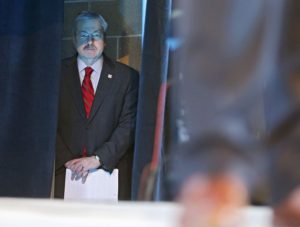Let’s be very clear: This isn’t about J. Bruce Harreld. It also isn’t about the University of Iowa.
Once, while describing a public relations transgression by UI officials, I wrote, “What a slice of rancid baloney.” How could I have known that one day Gov. Terry Branstad would serve an entire loaf?
Branstad, who continues to keep the Iowa Judicial Branch busy sorting out the legalities of his administration’s unilateral decisions to close state-run facilities, has suddenly decided he does, in fact, have limits. I know. Coulda knocked me over with a feather.
And, as much as I’d like to view the admission as the start of some sparkly new bipartisan magical mystery tour, Branstad’s proclaimed limits don’t exist.
At the end of September, UI faculty members called for the “immediate resignation and/or dismissal of the existing State of Iowa Board of Regents.” Branstad refused, saying, “I don’t have the authority to do that, and that is not appropriate.”
According to Iowa Code Chapter 262, Branstad is the only person who does.
Here are the two related sections:
“The governor, with the approval of the majority of the senate during a session of the general assembly, may remove any member of the board for malfeasance in office, or for any cause which would render the member ineligible for appointment or incapable or unfit to discharge the duties of office, and the member’s removal, when so made, shall be final. (262.4)
“When the general assembly is not in session, the governor may suspend any member so disqualified and shall appoint another to fill the vacancy thus created, subject to the approval of the senate when in session. (262.5)”
In case the initial lie wasn’t enough, Branstad also provided a follow-up.

“For them to advocate for me to do something illegal is inappropriate and they should know better,” Branstad told reporters.
The response might be shocking if it wasn’t … well, Branstad.
The Governor couldn’t be bothered to expand his statement, to say that he thinks the UI presidential search was above reproach and, therefore, did not rise to the level of misbehavior required by Iowa law. But then again, since the Governor also has been implicated, maybe he merely felt the need to strike a pre-emptive CYA pose.
Some have asserted that the votes of no confidence recorded by UI faculty and students were merely a reaction to the selected candidate. Those individuals are missing a very key point: the votes were directed at the Regents, not Harreld. And, unfortunately, the questions that remain unanswered can stain far more than a single Regents’ institution.
Those questions begin in early July — after the 21-member presidential search committee had been set in motion and an out-of-state consultant was hired — when one potential candidate received an invitation to speak to a group at the UI that included members of the search committee, including interim UI President Jean Robillard who was tasked with leading the group, and Regent President Bruce Rastetter. The following month Rastetter arranged for that same candidate, and only that candidate, to have a telephone conversation with Branstad.
And, before any other candidates were interviewed by the board, this same candidate met privately in Ames with four additional Regents — Mary Andringa, Milt Dakovich, Larry McKibben and Katie Mulholland — and had dinner with ISU President Steven Leath.
A follow-up email from Andringa to the candidate after the Ames meeting urged the candidate to “continue to give us in Iowa a chance to tap into your great skill set, experience, and passion for excellence through strategic change by being open to the presidency of the U of I.”
All of this took place after the Regents — who had the option of conducting a closed-door search — touted a more open selection process that would bring a slate of finalists before the public. All of this took place before the names of those finalists were publicly announced.
Further, the only reason we know that all of this took place is because of enterprising journalists like The Gazette’s Vanessa Miller. The Regents didn’t disclose it, and some members of the search committee only learned about the meetings after reading about them in the newspaper. It begs the question of what other relevations are yet to be discovered.
Students and faculty are understandably ticked off that they were duped into believing they would have a role in the process. Three other presidential finalists were marched out for public display, unaware they were, at best, at a severe disadvantage or, at worst, already out of contention.
Even those who have praised the selection of Harreld have expressed concern that the new UI president, who has not yet served a single day in the position, has already been tarnished and diminished due to the questionable actions of the public servants tasked with selecting him.
Actions taken by the Regents — initiating and promoting a selection process designed to provide transparency while simultaneously and purposefully undermining public trust — have already drawn negative national attention. The American Association of University Professors, which has authority to censure, has launched an investigation. If that group chooses to censure the Regents, future recruitment efforts for all its institutions would be more difficult. After all, who wants to put the time and effort into an application process with a body that may not be acting in good faith?
The only part of this saga without question is that Branstad’s experiment in political cronyism has catastrophically failed. If he can’t bring himself to suspend his own appointees for running amok and endangering the future of higher education throughout the state, then he should have the courage to do the one thing even he knows is within his authority: step aside.
This column by Lynda Waddington originally published in The Gazette on October 11, 2015. Photo credit: Stephen Mally/The Gazette
